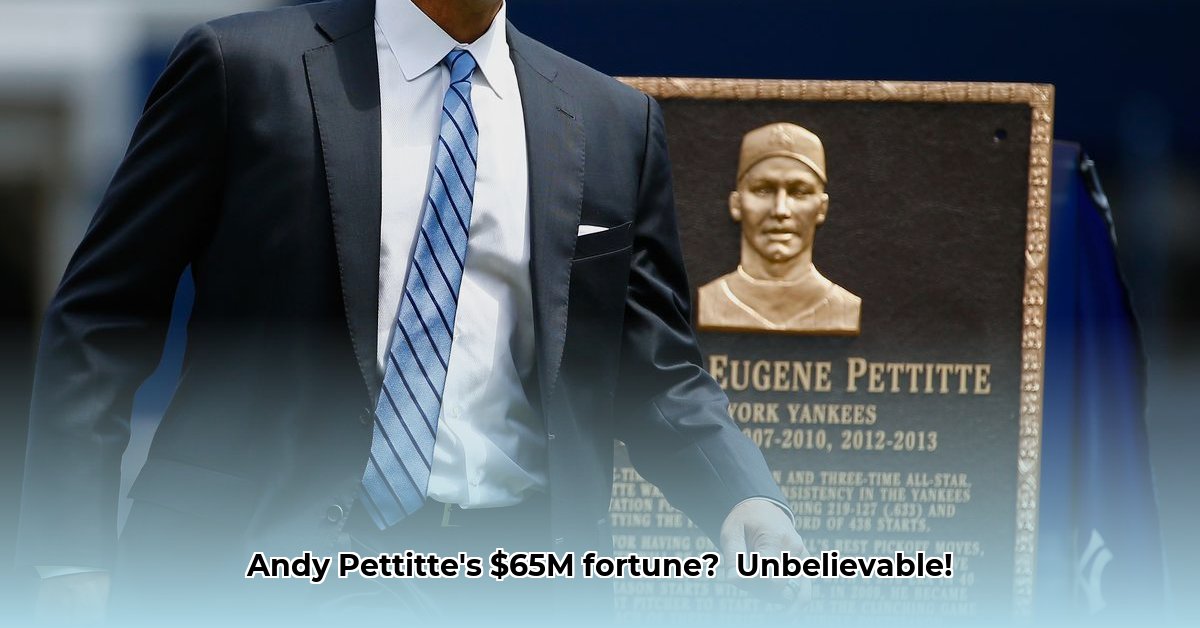
Andy Pettitte, a name synonymous with consistent pitching and postseason success, boasts a remarkable $65 million net worth. But this figure represents more than just a large bank account; it’s a testament to a carefully cultivated career, shrewd financial decisions, and a disciplined approach to wealth management. This case study delves into the factors contributing to Pettitte's financial success, examining his career earnings, contract negotiations, and the lasting impact of both his on-field achievements and off-field controversies.
A Career Built on Consistency and Strategic Financial Planning
Pettitte's $65 million net worth isn't the result of a single, lucky break. Instead, it's the culmination of a long and successful MLB career. His career earnings, totaling $146 million 1, formed the foundation of his substantial wealth. This figure reflects not only his exceptional pitching talent but also his strategic contract negotiations and remarkable durability. While he may not have consistently been among the league's highest-paid players, his unwavering performance and loyalty, particularly to the New York Yankees, generated lucrative contracts year after year. This exemplifies the power of consistent performance and strategic career planning in building long-term financial security. How many pitchers can boast such a steady climb to financial success in a sport as injury-prone as baseball?
Postseason Success and Brand Enhancement: Beyond the Base Salary
Pettitte's remarkable postseason record—a remarkable 19 wins, an MLB record—significantly boosted his value. This success elevated his brand recognition, giving him greater leverage in negotiations and amplifying his earning potential beyond his base salary. While not a global celebrity like some of his contemporaries, his impact on the field translated directly into increased financial rewards. Did his postseason dominance directly translate to millions in contract offers? The data suggests a strong correlation.
The HGH Controversy: A Complicating Factor in the Financial Narrative
While Pettitte's admission of HGH use in 2007 didn't immediately derail his financial success, it undoubtedly introduced a complicating factor. The long-term impact on his marketability and overall endorsement potential remains a subject of debate. While some argue it likely limited certain sponsorship opportunities, others contend its impact was minimal, given his strong reputation and continued high performance. A deeper analysis, incorporating data on similar cases and comparing his post-admission earnings to predicted earnings, would be necessary to comprehensively assess its long-term influence. This incident highlights the risk associated with reputational damage on an athlete's financial security.
Financial Savvy: A Conservative Approach to Wealth Accumulation
Unlike some athletes known for extravagant spending, Pettitte’s financial strategy appears to have been markedly conservative. This approach, focusing on long-term financial security rather than short-term gains, significantly contributed to his wealth accumulation. While details of his specific investment strategies remain private, his overall financial success suggests a disciplined and prudent approach to wealth management. This conservative approach serves as a stark contrast to many athletes whose wealth is quickly depleted after retirement.
Key Lessons from Pettitte's Financial Success
Three pivotal points emerge from Pettitte's journey:
- Sustained Performance: Consistent high-level performance forms the cornerstone of lucrative contracts and overall career earnings.
- Contract Negotiation: Skillful negotiations, leveraging both prior success and market value, are crucial.
- Financial Prudence: Disciplined spending and strategic investment choices play a decisive role in accumulating and retaining wealth.
Navigating the Risks: A Financial Risk Assessment
To fully understand Pettitte’s financial journey, we must consider potential risks:
| Risk Factor | Likelihood | Impact | Mitigation Strategy |
|---|---|---|---|
| Injury | High | Very High | Proactive injury prevention, tailored training programs, strategic rest periods |
| Performance Decline | Medium | High | Adaptable skill sets, flexible roles, strategic career transition planning |
| Contract Negotiation Issues | Low | Medium | Experienced agents, thorough contract review, strategic negotiation approaches |
| Reputation (HGH Admission) | Low | Medium | Community engagement, transparent communication, focus on continued positive contributions |
These risks highlight the importance of proactive planning and risk-mitigation strategies in securing financial stability within the dynamic environment of professional sports.
Conclusion: More Than Just a Number
Andy Pettitte's $65 million net worth isn't a random number; it's the result of a meticulously planned career, savvy financial management, and an unwavering commitment to consistent performance. This case study shows how sustained excellence on the field, coupled with shrewd financial decision-making, can translate into substantial long-term wealth. His story offers invaluable lessons for aspiring athletes and serves as a model for responsible financial planning in a high-stakes profession.